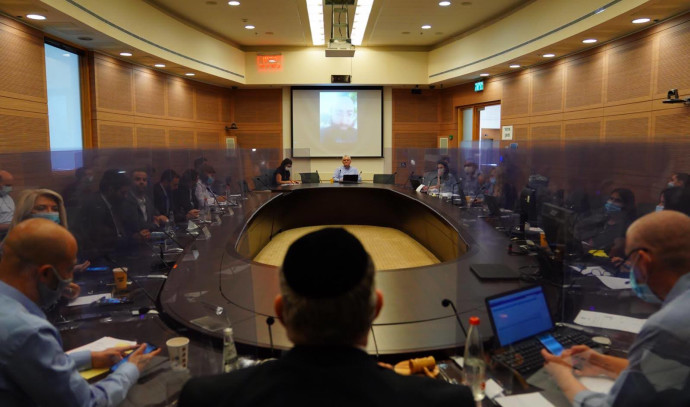The Constitution, Law and Justice Committee headed by the Member of the Knesset Jacob Asher Convenes today (Tuesday) to prepare the Fines Law for second and third reading. The heads of the ultra-Orthodox parties have pledged to Prime Minister Benjamin Netanyahu that the law will be followed according to the “Gafni-Levin” outline. Which stipulates that fines will increase gradually And that only a senior policeman could give them. The Likud clarifies “We will only support the compromise proposal we have proposed”.
The chairman of the committee said in his opening remarks: “The issues are difficult, we are talking here about the burden on the public, on all sectors. The fines should be given in proportion, any increase is at the expense of the public – and it does not matter what this public looks like. “He said,” This law comes because there is no consistent enforcement, but random, We are required to raise fines because the method does not work. So how do I deter? In the end, we will also reach the delusional offer of fines of NIS 20,000-25,000. “
MK Mickey glows, Argued that fines should be increased under mental supervision, and proposed a compromise regarding the closure of operating institutions contrary to the guidelines: “The closure will come only after a number of fines, ie at least after two or three fines. In such a compromise we can achieve the goal of the law.” There will be a discourse according to which they want to harm the Talmudic Torah. ” Zohar also supported the idea that a senior police official, with the rank of deputy lieutenant, would impose the significant fines, and even suggested that in such a case – the fine would be even higher.
The compromise proposal I presented to the Constitution Committee is very simple:
1. Heavy fines for those who develop educational institutions contrary to guidelines.
2. The closure of the institution will come after the first fine if the institution is not closed despite the fine received.The compromise is on my mind and I believe it is both right and can achieve the goal.
This is mental supervision according to every Torah opinion.– Miki Zohar Miki Zohar (@ zoharm7) January 26, 2021
In response, Blue and White wrote: “‘Honor, power, money.’ Zohar is trying to flatter the ultra-Orthodox parties, he will not help him. We will fight the Likud’s indulgence and achieve equal enforcement. The law of Bnei Brak is the law of Herzliya.”
Mickey “Honor, power, money” Zohar tries to flatter the ultra-Orthodox parties, will not help him. We will fight for the favor of the Likud and we will achieve equal enforcement. The law of Bnei Brak is the same as the law of Herzliya. https://t.co/0soEoHc4oo
– Blue and white (@ Kachollavan19) January 26, 2021
The chairman of the Constitution Committee said at the hearing: “It is easiest to plug the hole by bringing in six more axes. It requires us to check well what we are doing, because in the end it is to take money out of people’s pockets. We have a responsibility. “He added:” The buyer is here as a committee member. We sat here for months on the law. “Suddenly you are sanctifying the government’s proposal?”
He emphasized: “If it is decided to open education and it is possible to take a calculated risk in green and yellow localities, a solution must also be found for orange and red localities, so that they will work partially.”
 Chairman of the Law Committee, MK Yaakov Asher (Photo: screenshot)
Chairman of the Law Committee, MK Yaakov Asher (Photo: screenshot)More Lilach Wagner From the Ministry of Justice, she said: “It is important to us that the fines be adjusted to the administrative offense. Right now, in rethinking, we are raising the fines to up to ten thousand shekels, and this is a limit that we do not want to cross at the moment, And the proposal talks about events, weddings and institutions. We went to problematic points where fines can be effective. A fine of 5,000 shekels for an event garden that receives hundreds of thousands for an event in one evening, it is not an adhesive that encourages him not to do an event, he will be willing to absorb it. On the other hand, we do not want to go up to very high fines, because the finer will prefer to get a cancellation, or ask to be tried and push the end – and then there is no deterrence. A fine that is too high is unpaid and ineffective“Therefore, the height of ten thousand is still considered an effective violation.”
“The fine is a potential fine, so we thought the differentiation should be reflected in the bylaws. This is the place to do this work, and take into account the size of the business, the number of employees in it, and regarding educational institutions – the number of students, the size of the institution,” she added. “It means, “A fine of ten thousand is not absolute, and will be given according to a range that will be determined and anchored in the regulations, especially to the large businesses that benefit from opening their businesses.”, She explained. The Ministry of Justice also opposes an amendment proposed by MK Asher, according to which the maximum fine will be imposed only by a senior police officer.
MK Glory Friedman Claim: “The main claim is for unequal enforcement, what will help us with the level of the fine if we enforce it unfairly?”.
MK Ahmed Tibi Speaking to the committee, he claimed, “Enforcement is selective and discriminatory. Whenever there are double fines – we ‘jump in’ to prevent selective enforcement in the Arab sector.”
In blue and white, the committee is required to approve the same wording that was approved on first reading in the Knesset plenum. According to the wording now submitted to the Constitution Committee, the fine will amount to a maximum of NIS 10,000 and only a police officer can give a fine and there are no closure orders for institutions.
The outline proposal came up at the beginning of the discussions on the law. Knesset Speaker Yariv Levin proposed and Finance Committee Chairman and MK Moshe Gafni formulated this in front of him in consultation with Knesset Legal Adviser Sagit Afek. Last night things were finally agreed.
Prior to the hearing, MK Asher said that “the bill that was submitted in the past for NIS 20/25,000, according to which any police officer can walk around with a notebook on almost any violation, is an abnormal thing and there was sharp criticism from the committee members. “Because it was excessive and perhaps because it was done to want pressure, we came to this whole saga.”
Yesterday, the Knesset plenum approved the bill to increase fines and close businesses and educational institutions that operate in violation of the closure restrictions in the first reading, by a majority of 52 supporters against 23 opponents. Among other things, the proposal includes increasing the amount of fines from NIS 5,000 to NIS 10,000, as well as giving authority to police officers or a district doctor to close institutions that operate in violation of the guidelines. The ultra-Orthodox and Arab Knesset members opposed the proposal. According to a report from here 11, following the approval of the proposal, Netanyahu spoke with the leaders of the ultra-Orthodox parties and said: “Raising the fines – only with your consent.”
Minister of Defense and Justice, Bnei Gantz, Issued an ultimatum to the Prime Minister’s party: “I will not approve to bring the closure regulations up for discussion until the full outline of the plenum fines has been passed. This means that if the outline of the fines does not pass by tomorrow evening, the decision on the continuation of the closure will be transferred to the Knesset plenum, where the coalition does not have a majority without blue and white. “
Following Gantz’s appeal, after approving the Fines Law on first reading, Netanyahu spoke with the Speaker of the Knesset and coalition leaders and demanded that the Fines Law be passed immediately in the second and third readings.
According to the proposal, in order to create an effective sanction that would constitute an appropriate deterrent, it is proposed to increase the amount of the maximum administrative fine set for opening businesses or educational institutions in violation of the guidelines so that it will stand at NIS 10,000 instead of NIS 5,000 so far. Raising the maximum fine amount will allow for the determination of the level of fines in the regulations in accordance with the number of participants in the event.
In addition, it is proposed that a police officer with the rank of deputy superintendent or higher or a district physician be able to issue administrative closure orders to institutions that conduct educational activities for students, in violation of the prohibition. Under the proposal, the authorized entity will be able to command in writing the entity in charge of the institution as its proposed definition, for reasons to be recorded in the order, to close the institution or part of it to students.
The proposed amendment is intended to provide additional tools for dealing with the above-mentioned violations by educational institutions that operate in violation of the prohibition on opening them, in a manner that will allow them to be physically closed even if they do not comply with the normative provision prohibiting their operation.
